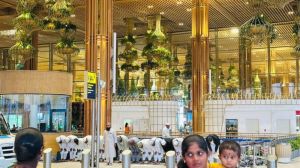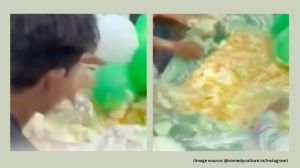China rolls out red carpet for Art of Living ashram
China's hunger for Indias cotton,minerals and plastics is well-documented and,at times,controversial.
China’s hunger for Indias cotton,minerals and plastics is well-documented and,at times,controversial. Now China is importing a raw material of a different kind Indian spirituality.
Last month,with the full support of Chinas Communist Party,Indian guru Sri Sri Ravishankar launched his Art of Living ashram in Beijing,a 168-acre landscaped marvel that came up in less than six months,complete with hundreds of natural hot springs and wooden buildings in traditional Chinese architecture.
A base in Beijing,a first for any overseas spiritual leader,ensued after a group of Chinese connected to the Communist government arrived in Bangalore to invite the Indian guru. Until end-October,Art of Livings only China link was the mainlanders who came to its training and teaching courses in India and elsewhere.
The ashram came about because Chinas leaders are intelligent and attuned to their societys needs,said Sri Sri Ravishankar in an interview to The Indian Express. With rapid economic progress,there is stress,tension and a breakdown of family values in China, he said in a conversation at his Art of Living headquarters just outside Bangalore,a lush 110-acre ashram that is now dwarfed in scale by its Beijing branch.
Economic powerhouse China,Indias largest trading partner,has seen a breakneck rise in wealth,materialism and conspicuous consumption rivaling its neighbor.
Chinas leaders studied Art of Livings values,translated its books and realised that the teachings help in restoring harmony,Sri Sri Ravishankar said. As testimony to the governments support the ashram was built in a record time. In India,even a plan takes a year and a site map would not have been ready in the four months they took to build the ashram, the spiritual leader said.
Art of Living,or AOL as it is often called,will take a combination of spirituality,yoga and ayurveda to China. The aim is to relieve both individual stress and societal problems,the guru said.
AOLs entry into China is even more significant considering that the China communist regime has ruthlessly suppressed manifestations of spirituality,such as the Falun Gong which rose in the late 1990s,for fear that it would encourage democracy. Closer home,Tibets spiritual leader Dalai Lama has been in exile in India since 1959.
Sri Sri Ravishankar says that his brand of spirituality transcends religion and teaches human values like love and compassion that form the heart of all cultures. His Sudarshan Kriya,a rhythmic breathing technique,is patented and taught at all Art of Living courses where attendees have to sign a non-disclosure agreement.
Our teachings are spiritual,scientific and non-controversial, says Sri Sri Ravishankar. They make people happy and calm and do not contradict any religion, he said.
Still,the launch of the Beijing ashram came with the usual Communist Party caveats. The Indian gurus discourses in Beijing during the first-ever three-day China visit in end-October were confined to groups of 500 Chinese at a time,even though he has a few thousand followers in the city. The permission-taking is a long,cumbersome process for 501 or more people, he said. Communist Party officials were present throughout.
The Indian guru has now been invited to expand his spiritual work to other Chinese cities. They want to bring all that is good to their people, Sri Sri Ravishankar said.
So while politics and economics have dominated the India-China agenda for decades,spirituality could be the turning point.



- 01
- 02
- 03
- 04
- 05




























